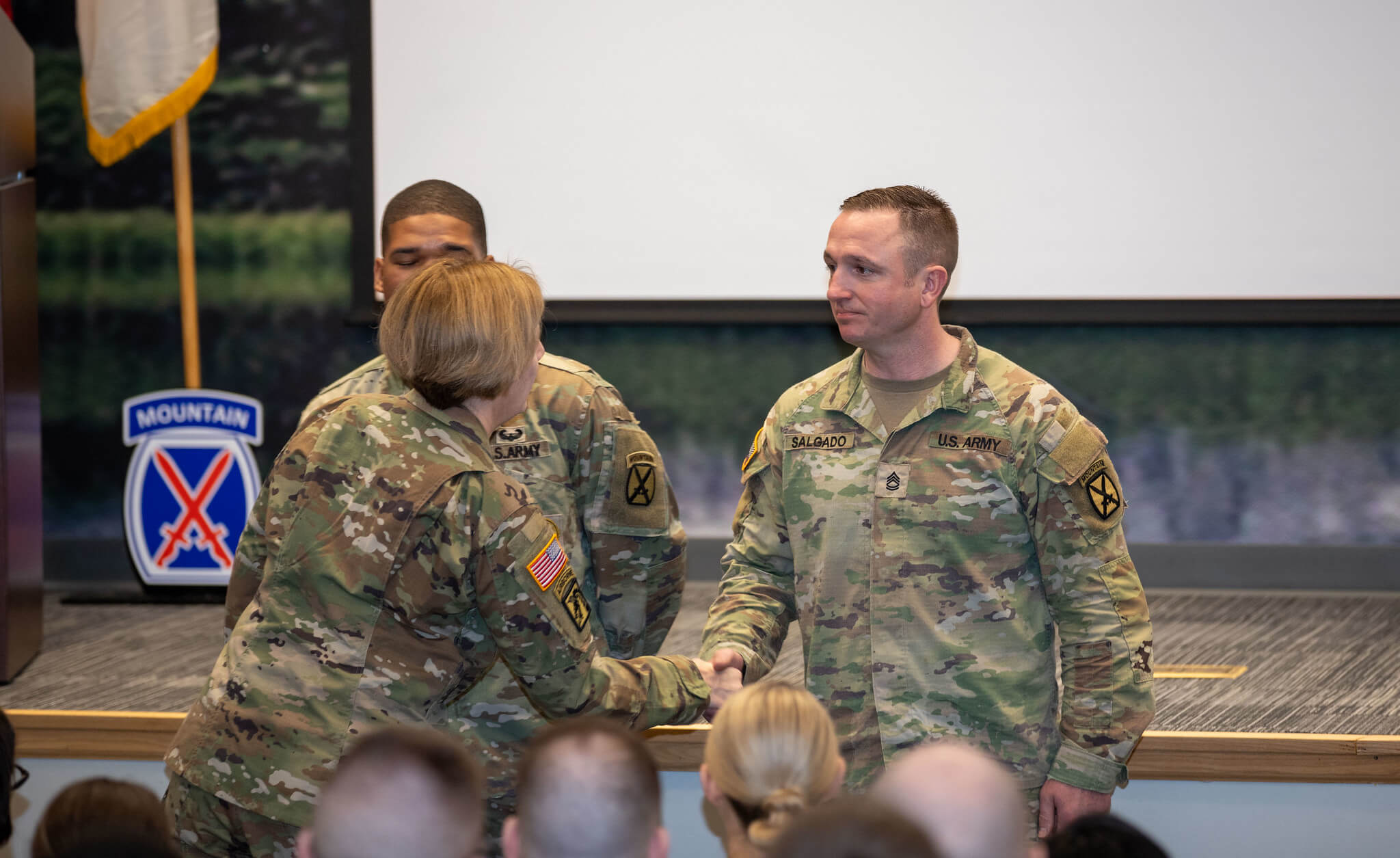A ‘Sweeping Overhaul’ of the JAG Corps Poses Likely Dangers
Hegseth’s planned changes could have serious consequences for how the U.S. military operates and holds service members accountable.

In February, Secretary of Defense Pete Hegseth fired the Air Force’s and Army’s top judge advocates general (JAGs). Last month, he commissioned his personal lawyer as a Navy JAG. He is now reportedly paving the way to make major changes within the JAG Corps—including how military lawyers advise on the law of war and prosecute those who violate it. These moves raise concerns that the JAG Corps could be compromised by partisan appointments and bad faith interpretations of the law, with wide-ranging consequences for how the U.S. military conducts operations and disciplines personnel.
Secretary Hegseth and the JAGs
On the evening of Feb. 21, President Trump fired the chairman of the Joint Chiefs of Staff, C.Q. Brown, the chief of Naval Operations, Adm. Lisa Franchetti, and the vice chief of staff of the Air Force, Gen. Jim Slife. On the same night, without any notification, Secretary Hegseth cut the top two uniformed lawyers of the Air Force and Army (referred to as “TJAGs”), Lt. Gen. Charles L. Plummer and LTG Gen. Joseph B. Berger III, respectively—the Navy position, previously filled by Vice Admiral Christopher French (retired as Rear Admiral), is currently filled by Acting Judge Advocate General Rear Admiral Reynolds. In what was described as the Defense Department’s “Friday night massacre,” many commentators were more alarmed by Hegseth’s removal of the TJAGs than the president’s firing of the chairman. The actions taken were also unprecedented—no secretary of defense in recent memory has targeted JAGs in this way.
As described by experts, judge advocates, like other servicemembers, fill non-partisan roles. The thousands of lawyers serving in the JAG Corps are tasked with providing independent, neutral, and fact-based legal advice on domestic and international law across the rank and file, up to the highest-level commanders. Under 10 U.S.C, no officer or Department of Defense employee—political or career—may interfere with the ability of JAGs to give independent legal advice.
In firing the TJAGs, Hegseth did not point to any misconduct to justify his decision. His only stated reasons were that he considered the TJAGs not “well-suited” for the job, and he wanted to avoid “roadblocks to orders that are given by a commander in chief.” While troubling for him to imply that only loyalists to the president should be in these positions, the secretary’s public statements prior to assuming his post made plain that he views military lawyers as obstructionists and the laws they advise on, including the Geneva Conventions, as outdated and too restrictive. To illustrate his opinion of military lawyers, in his book he recalled a time during his military service when he used a degrading term—“jagoffs”—to describe them.
Further changes are also reportedly afoot. On March 7, the secretary commissioned his personal lawyer of the last eight years, Timothy Parlatore, to be a Navy commander in the JAG Corps as a reservist. The New York Times reports that Parlatore is assigned to a unit serving the secretary of defense and will “focus on improving how the military’s uniformed lawyers are trained.” After the commissioning, the Guardian reported that once Hegseth replaces the TJAGs, he is planning a “sweeping overhaul” of the entire JAG Corps. Parlatore is picked to oversee this effort, reportedly aimed at ensuring more expansive legal interpretations to ensure greater latitude for battlefield tactics and more leniency toward service members who commit war crimes.
JAGs as Advisers and Prosecutors
Based on his statements, Hegseth appears to consider JAGs as problematic in two ways: (a) in their role as legal advisers to servicemembers in the field and secretaries of the military departments and (b) as prosecutors of servicemembers accused of violating the Uniform Code of Military Justice (UCMJ), a body of laws that govern the military justice system, particularly when it comes to law of war violations. His objection does not appear to be with any single individual, but rather, with the entire profession; in fulfilling these roles as advisers and prosecutors, he views JAGs as interfering with efficient war-fighting, or, as he describes it, a “warrior’s ethos.”
JAGs as Advisers
Hegseth has questioned the JAG’s role in providing advice in the context of the battlefield. He has argued that applying “restrictive” rules of engagement makes it difficult to “defeat our enemies.” His ad hominem attack in his book occurred in the context of a presentation from a JAG on the rules of engagement when launching a rocket-propelled grenade. Hegseth claimed the protocols described were “going to get people killed.” With the February firings, the secretary also questioned the TJAGs’ role in advising the secretaries of the military departments, describing them as potential “roadblocks” to orders from the president.
There are a few separate issues to parse here.
First, it is important to clarify that JAGs generally do not play a decision-making role. JAGs act as advisers to commanders and civilian officials who make critical decisions for the U.S. military, such as the development of battlefield strategy and the military’s rules of engagement (which include layers of policy in addition to bare minimum legal requirements). Even though JAGs advise on questions about how the Geneva Conventions are interpreted, those questions are ultimately answered by civilian lawyers and policymakers.
Second, JAGs are only roadblocks insofar as their professional role is to stop illegality. For example, on the battlefield, JAGs fill an important role in advising on the laws that constrain militaries and combatants, such as mitigating harm to civilians, refraining from inflicting unnecessary suffering, and providing protections to prisoners of war. In the Pentagon, JAGs fill the critical role of providing legal advice on the domestic and legal implications of the actions of the Department. U.S. officials have long understood that compliance with the law, including the law of war, protects in many ways, e.g., from criminal prosecution and in maintaining legitimacy. The institutionalized legal advice across the Defense Department only acts as an obstacle to unlawful acts.
Third, the record shows that the U.S. military is perfectly capable of fighting wars with JAGs in place to support the military’s compliance with U.S. law and related policies. In the conflicts that followed the 9/11 attacks, the U.S. military has fought wars in Afghanistan, Iraq, Syria, Somalia, Libya, Yemen, and Pakistan; conducted annual security cooperation exercises and trainings with dozens of foreign forces around the globe; carried out secret missions with U.S. special forces; supported law enforcement on the southern border; and much more.
JAGs as Prosecutors
Secretary Hegseth has also expressed disdain for JAGs who prosecute service members returning from tours in war zones. As a Fox News host, he publicly and privately lobbied President Trump during his first term to clear three service members accused of or prosecuted for war crimes in Iraq and Afghanistan. Trump pardoned two of them and reversed a third’s demotion. One of those service members was Eddie Gallagher, a Navy Seal (represented by Hegseth’s current attorney, Timothy Parlatore) accused of executing civilians, including stabbing to death a teenaged ISIS prisoner (“Good story behind this. Got him with my hunting knife.” he texted a friend. He later claimed that the teenager was going to die and that his unit had planned to “do medical treatments on him until he’s gone”.) After an about-face on the stand from one of the key witnesses in his unit, Gallagher was acquitted of most charges, but found guilty of taking a photo with a corpse in violation of the UCMJ.
Based on statements from Hegseth, he considers these kinds of war crimes prosecutions to be “second guessing” servicemembers, an action equivalent to “throwing them under the bus” after they come home from war. He believes that “the benefit of the doubt should go to the guys pulling the trigger” and said that the Navy was “on a witch hunt against Eddie Gallagher” for not killing “ISIS in the way they want him to.”
This perspective, if extended across the board, would be a recipe for rampant impunity for U.S. troops who commit war crimes, encouraging further violations.
Potential Consequences of Hegseth’s Actions
The Friday night firing of the TJAGs and the reported preparation to overhaul the JAG Corps and review the Defense Department’s law of war interpretations could curtail legal review of military actions, with serious consequences.
First, if the secretary of defense is willing to fire the highest ranking JAGs to ensure Defense Department leadership receives legal advice that doesn’t interfere with his agenda, it could well have a chilling effect on the JAGs whose independent and principled legal advice might impede the administration’s policy preferences. If the firings, coupled with statements from the secretary about JAGs and the law, chill advice during military operations, it will almost surely lead to more law of war violations.
Second, Hegseth’s civilian general counsel is likely to channel the secretary’s impulses to loosen rules on civilian protection. JAGs have traditionally seen the law of war as protective of U.S. interests and therefore have resisted novel or watered-down interpretations. Losing the independent advice of JAGs means losing an important advocate for that perspective on the law of war.
Third, strong lawyers could be critically important during the coming period for precisely the reason that Hegseth has suggested they need to be removed: It could be a very precarious time in terms of the legality of the things the military is asked to do. These could include domestic actions that would seem to run afoul of the Posse Comitatus Act. Or they might involve international actions that the president has at various times entertained that the military would have to carry out—such as using force to take Greenland; taking military action against Iran; striking drug cartels in Mexico; or seizing control of the Panama Canal. Having credible JAGs in place may not have much impact on whether the military is ultimately used on these missions, but it at least can help ensure that commanders have sound legal advice when they make crucial decisions about missions.
Finally, and perhaps most troubling, if the secretary is firing JAGs now—before they offer legal advice on any issue of consequence—it sends a message that even the most principled TJAGs likely will not thwart this administration if it is determined to take illegal action.
***
A new administration has the right to effectuate its own lawful policies, which can include firing and hiring lawyers. But the manner in which this happened at the Department of Defense was unprecedented. And it raises concerns that what Secretary Hegseth wants is not good lawyering, but instead carte blanche. That would be detrimental for the soldiers who might have to carry out unlawful orders, the country they represent, and the innocent people who could, as a result, lose the few protections afforded them amid the brutality of war.


.jpg?sfvrsn=407c2736_6)
